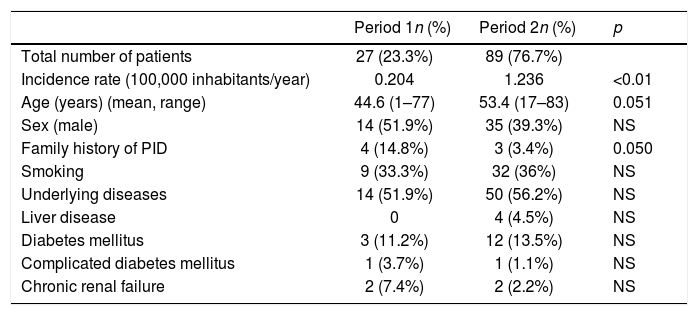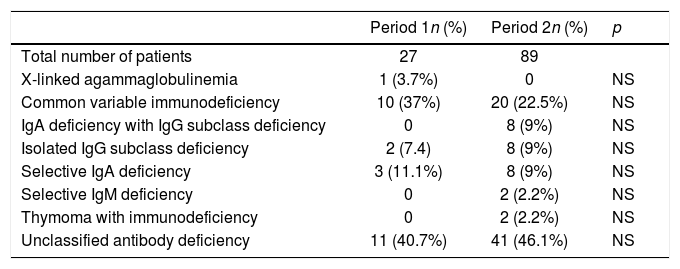Predominantly antibody deficiencies are the most prevalent primary immunodeficiency (PID) in adults. These are rare diseases difficult to diagnose. Therefore, they are diagnosed late. This study aims to evaluate whether an awareness campaign of PIDs among physicians is associated with an increase in number of diagnoses, a reduction in diagnostic delay and diagnosis at earlier stages.
Patients and methodsA single centre, interventional, quasi-experimental study was designed that included 2 periods, period 1 pre-intervention (1986–2008) and period 2 post-intervention (2009–2018). A descriptive comparative study of variables was carried out in both periods.
Results116 patients were included [27 (23.3%) in period 1 and 89 (76.7%) in period 2]. The incidence rate increased significantly (0.204 and 1.236/100,000habs./year; p<0.05), the diagnosis delay tended to be lower (4 vs. 3.73 years). The reasons for diagnostic suspicion were diverse and the burden disease at diagnosis (expressed by bronchiectasis, altered spirometry, ability to generate antibodies by thymus-independent mechanism and need for substitute treatment) tended to decrease in period 2.
ConclusionsGiven the potentially serious complications of patients with late diagnosis of PIDs, it is necessary to create specialised multidisciplinary units, to unify assistance protocols and to design interventions to increase the knowledge of these entities.
Las deficiencias predominantemente de anticuerpos constituyen, en la actualidad, el grupo de inmunodeficiencias primarias (IDP) más prevalente en adultos. Son enfermedades complejas desde el punto de vista clínico, catalogadas como minoritarias y que tienen a menudo un retraso inaceptable en su diagnóstico. El objetivo de este estudio fue evaluar si un mejor conocimiento de estas entidades podía conllevar un incremento en el número de diagnósticos, una reducción en el intervalo al diagnóstico y, por ende, una disminución en la carga de enfermedad al diagnóstico.
Pacientes y métodosSe diseñó un estudio de intervención casi experimental y Unicentro, que incluyó dos períodos, período 1 preintervención (1986-2008) y período 2 postintervención (2009-2018). Se efectuó un estudio descriptivo comparativo de diversas variables en ambos períodos.
ResultadosSe incluyeron 116 pacientes [27 (23,3%) en el período 1 y 89 (76,7%) en el período 2]. La tasa de incidencia aumentó de forma significativa (0,204 y 1,236/100.000 habs./año; P < 0,05), el retraso en el diagnóstico tendió a ser menor (4 vs. 3,73 años), los motivos de sospecha diagnóstica se diversificaron y la carga de enfermedad al diagnóstico (expresada por bronquiectasias, espirometría alterada, capacidad de generar anticuerpos por mecanismo timo-independiente y necesidad de tratamiento substitutivo) tendió a disminuir en el período 2.
ConclusionesDadas las complicaciones potencialmente graves de los pacientes con diagnóstico tardío de IDP, es necesaria la creación de unidades multidisciplinarias especializadas, la unificación de protocolos asistenciales y el diseño de intervenciones para la divulgación de esta entidad.












